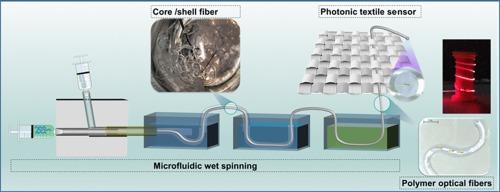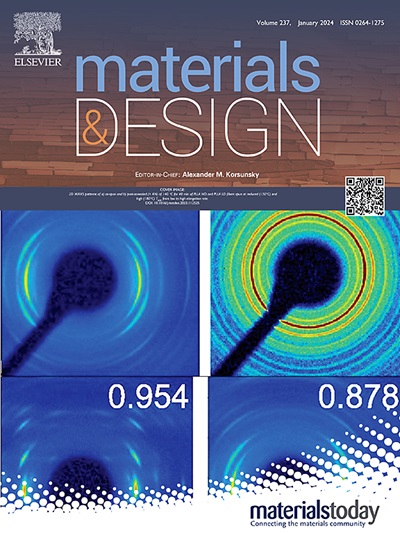微流体湿法纺制聚二甲基硅氧烷软聚合物光纤
IF 7.6
2区 材料科学
Q1 MATERIALS SCIENCE, MULTIDISCIPLINARY
引用次数: 0
摘要
聚合物光纤(POF)是光子纺织传感器的重要组成部分,可用于开发 "医疗保健@家庭 "技术。然而,制造具有此类应用所需特性的定制 POF 仍具有挑战性。本文介绍了一种基于聚二甲基硅氧烷制造软 POF 的创新方法:水凝胶辅助微流体湿法纺丝(HA-MWS)技术。结合简单的后处理步骤,HA-MWS 能够生产出具有定制模量(0.35 MPa 至 5.0 MPa)、低表面粗糙度(Rq< 6 nm)的软 POF,从而实现低衰减(<0.25 dB/cm)。对 HA-MWS 制成的软 POF 的准静态和动态机械、化学、光学、热学和表面特性进行了详细研究。利用这些软 POF 制作的光子纺织品传感器演示器具有量身定制的 2-300 kPa 压力灵敏度、接近皮肤的模量以及 -30 C∘ 和 90 C∘ 之间的高温稳定性。这种方法有可能成为设计具有可调特性的 POF 的标准工具,用于医疗保健监测、软机器人和生物医学应用。本文章由计算机程序翻译,如有差异,请以英文原文为准。

Microfluidic wet spinning of soft polydimethylsiloxane polymer optical fibers
Polymer optical fibers (POFs) are an essential component of photonic textile sensors for the development of healthcare@home technologies. However, fabricating tailored POFs exhibiting the required properties for such applications remains challenging. Here, an innovative method to fabricate soft POFs based on polydimethylsiloxane is introduced: the hydrogel-assisted microfluidic wet spinning (HA-MWS) technology. Combined with a straightforward post-processing step, the HA-MWS enabled the production of soft POFs with tailored moduli (0.35 MPa to 5.0 MPa), low surface roughness ( 6 nm), and, consequently, low attenuation (<0.25 dB/cm). The quasi-static and dynamic mechanical, chemical, optical, thermal, and surface properties of the soft POFs produced by HA-MWS were investigated in detail. A photonic textile sensor demonstrator was built with these soft POFs with tailored pressure sensitivity in the range of 2–300 kPa, modulus close to that of skin, and high-temperature stability between -30 and 90 . This methodology can potentially become a standard tool for designing POFs with tunable properties for healthcare monitoring, soft robotics, and biomedicine applications.
求助全文
通过发布文献求助,成功后即可免费获取论文全文。
去求助
来源期刊

Materials & Design
Engineering-Mechanical Engineering
CiteScore
14.30
自引率
7.10%
发文量
1028
审稿时长
85 days
期刊介绍:
Materials and Design is a multi-disciplinary journal that publishes original research reports, review articles, and express communications. The journal focuses on studying the structure and properties of inorganic and organic materials, advancements in synthesis, processing, characterization, and testing, the design of materials and engineering systems, and their applications in technology. It aims to bring together various aspects of materials science, engineering, physics, and chemistry.
The journal explores themes ranging from materials to design and aims to reveal the connections between natural and artificial materials, as well as experiment and modeling. Manuscripts submitted to Materials and Design should contain elements of discovery and surprise, as they often contribute new insights into the architecture and function of matter.
 求助内容:
求助内容: 应助结果提醒方式:
应助结果提醒方式:


